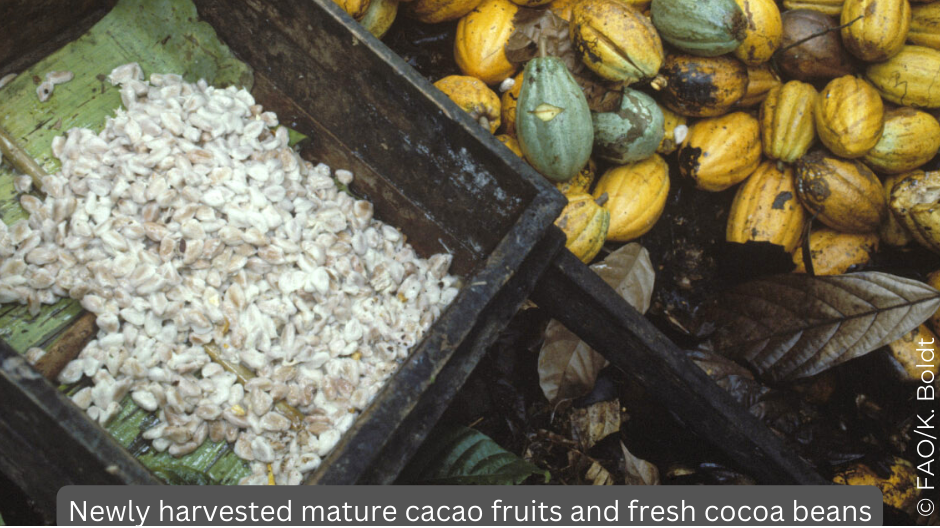Zero-deforestation cocoa sweetens World Food Day

Cacao
©FAO/K.Boldt
This World Food Day, you can have your chocolate and fight climate change too! Cocoa that is produced sustainably under dense and diverse tropical forest canopies can help developing countries lower their greenhouse gas (GHG) emissions and achieve their climate goals. Now, the world’s leading cocoa producer – Côte d’Ivoire – is taking action to promote zero-deforestation cocoa, and other countries will likely follow suit.
The Food and Agriculture Organization of the United Nations (FAO) and the Green Climate Fund (GCF) are working together to help Côte d’Ivoire promote zero-deforestation cocoa in the country’s south-west region. USD 11.7 million has been raised to halt deforestation through the recently approved FAO-led, GCF project called PROMIRE – Promoting zero-deforestation cocoa production for reducing emissions in Côte d’Ivoire. Throughout its 5-year implementation and 20-year lifespan, the project will tackle the drivers of deforestation by transforming the cocoa value chain into one that benefits smallholder farming communities and protects forests.
How is unsustainable agriculture driving deforestation in Côte d’Ivoire?
Agriculture is the powerhouse driving economic growth in Côte d’Ivoire, and cocoa production dominates the sector – it is the country’s largest export and makes up one-third of the world’s cocoa supply. According to FAO, Côte d’Ivoire produced more than 1.9 million tonnes of cocoa in 2018, up from 1.3 million tonnes in 2010. The problem is that unsustainable agriculture fuels deforestation and land degradation; 62 percent of the country’s deforestation is attributed to agriculture, about one-third of which is related to cocoa production.
How prized is cocoa as a commodity?
Dried and fermented cocoa beans – containing carbohydrates, protein and particularly fat – are considered a primary food crop. The International Institute for Sustainable Development (IISD) reports that exported cocoa beans had a combined value of USD 8.6 billion in 2017. In the same year, the chocolate industry consumed 43 percent of all cocoa, and had a retail market value of USD 106.2 billion.
Although companies and consumers are willing to pay a premium for cocoa and cocoa products, the farmers that grow cocoa beans see only a fraction of these profits: Cocoa farmers in Côte d’Ivoire and Ghana earn only 3 to 6 percent of the chocolate bars’ retail market value. Struggling smallholder farmers are at even greater risk of spiralling into poverty when low incomes are coupled with market price volatility and additional pressures brought on by the COVID-19 pandemic.
“We need to sustain cocoa farmers by increasing their competitiveness, building their resilience to climate change, and reducing their vulnerability to fluctuating market prices and demand,” says Eduardo Mansur, Director of FAO’s Office of Climate Change, Biodiversity and Environment (OCB).
How are climate change and cocoa production interlinked?
Although chocolate is consumed largely in the world’s cooler regions – Europe and North America are the top importers – cocoa is produced in tropical climates that are particularly vulnerable to the impacts of climate change. Much like neighbouring Ghana, Côte d’Ivoire’s tropical climate makes it one of the most suitable places on Earth to produce cocoa; yet, the country is ranked amongst the most vulnerable to climate change.
The impacts of climate change, such as increasing temperatures and decreasing rainfall, lead to reduced soil fertility and increased water scarcity, both of which are detrimental to crop production. Unsustainable agricultural practices exacerbate the impacts of climate change by reducing forest cover and degrading forest ecosystems.
Can zero-deforestation cocoa production bring about change?
Naturally shaded cocoa agroforestry systems – such as farming in forests and along forest margins – help conserve and protect biodiversity and at the same time generate income for small-scale cocoa producers.
Under the PROMIRE project, cooperatives will become more competitive by learning how to present their business plans to both Micro-Finance Institutions (MFIs) and the major cocoa companies operating in the country. Similarly, the private sector will be actively encouraged to invest in sustainable agroforestry activities that not only stop deforestation, but also improve agricultural productivity.
“Inaction on deforestation is not an option; global solidarity is the solution. Thanks to this GCF project, we can scale up sustainable agroforestry practices, reduce GHG emissions, conserve biodiversity and improve the well-being of people who depend on agriculture for their livelihoods,” says Samy Gaiji, FAO Representative in Côte d’Ivoire.
What role does REDD+ play in zero deforestation cocoa?
REDD+ is a mechanism under the United Nations Framework Convention on Climate Change (UNFCCC) that helps developing countries reduce emissions from deforestation.
The PROMIRE project will scale up REDD+ activities in line with the commitments laid out by the Government of Côte d'Ivoire in its Nationally Determined Contributions (NDCs) – to reduce its GHG emissions by 28% compared to the business as usual scenario. This includes building on the success of a REDD+ pilot project in the La Mé region that helped farmers – both men and women – produce sustainable, organic, fair-trade cocoa with zero deforestation.
Children’s rights and the root causes of child labour will also be the focus of awareness raising campaigns in the context of REDD+. According to UNICEF, more than 3 million children live in cocoa-growing communities in Côte d’Ivoire. Addressing children’s rights in the supply chain is a cornerstone of sustainability; it requires the collective efforts of all actors in the sector to put an unequivocal stop to child labour.
How does FAO help countries access climate finance?
As an Accredited Entity to GCF – the world’s largest dedicated fund for climate action – FAO mobilizes climate finance flows and catalyses investments for country-driven projects that build climate resilience and promote economic growth in line with the Sustainable Development Goals (SDGs).
World Food Day is a reminder that our actions are our future, and we can all help take a bite out of deforestation by supporting sustainable, zero-deforestation cocoa.


